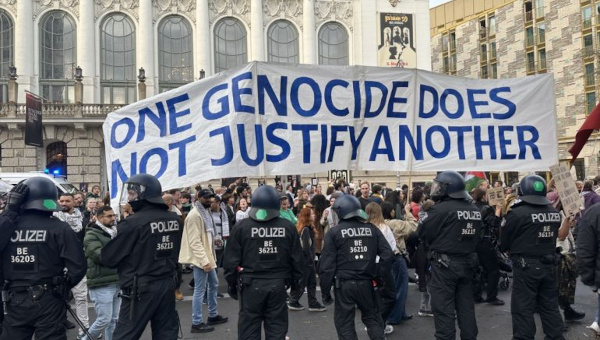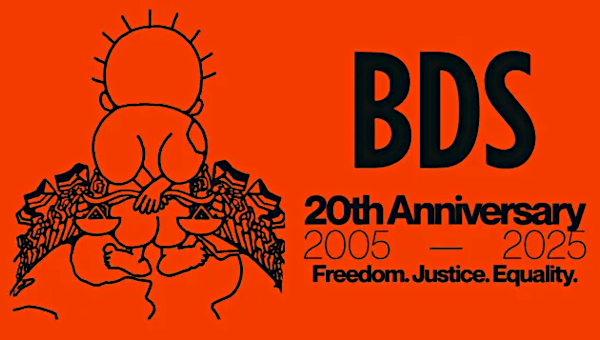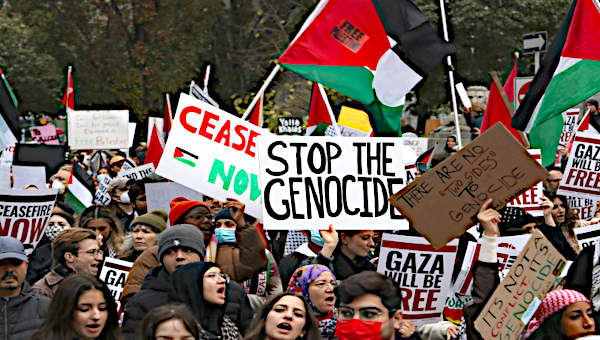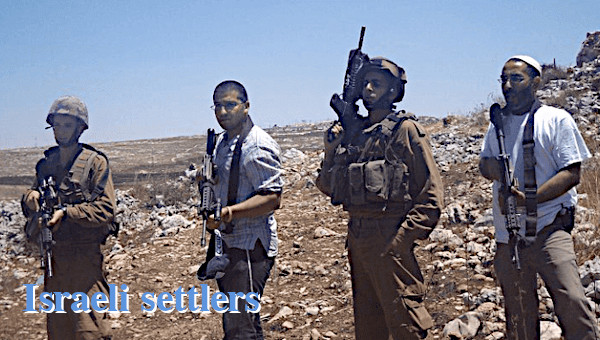BDS@20: Redefining International Solidarity
On July 9th, we marked a milestone in the liberation struggle of the Indigenous people of Palestine, as the Palestinian-led nonviolent, anti-racist BDS movement completes 20 years of grassroots organizing and building intersectional people power. This day will be remembered in history as the start of a principled, strategic, and creative process that has isolated Israel’s 77-year-old regime of settler-colonialism, apartheid, and military occupation at the grassroots and institutional level. It has redefined the meaning of solidarity with our struggle as starting with ending the complicity of states, corporations and institutions with this regime.
Meaningful solidarity, as BDS has tirelessly advocated, must uphold the fundamental ethical principle of doing no harm and stopping or offsetting harm done in one’s name.
Yet in the midst of Israel’s livestreamed genocide against 2.3 million Palestinians in the occupied and besieged Gaza Strip, we are too grieved and too enraged to celebrate the phenomenal BDS impact. But we owe it to every single Palestinian, especially our people in Gaza, to reaffirm our unbreakable commitment to march on until Israel’s regime of oppression is entirely dismantled. This obliges us to recognize and share with the world the immense people power we have collectively built over these two decades and the many milestones we have reached toward isolating genocidal Israel as a rogue state that threatens humanity at large.
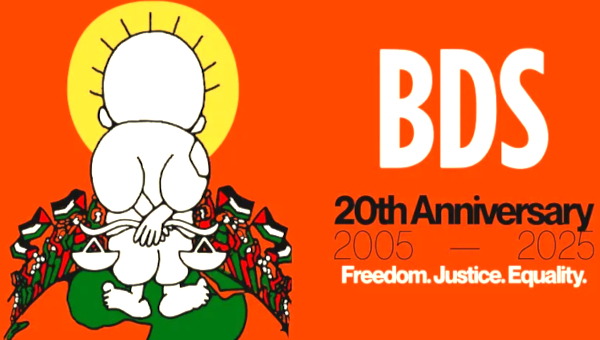
From Grassroots to Grasstops
Building power from the grassroots to the grasstops, the BDS movement has created an unprecedented level of global solidarity coordination and pressure to end Israel’s impunity and global complicity in its crimes. Despite the painful fragmentation of our people, due to the phases of settler-colonial conquest and the destructive Oslo process, our movement has been led by the largest Palestinian coalition ever, with entities representing the absolute majority of Palestinians inside historic Palestine as well as in exile, and has maintained consensus on its goals and strategies.
With the moral authority that this consensus provides, the BDS movement has influenced states’ decisions to impose targeted sanctions on Israel. It has played an indispensable role in pressuring some of the world’s largest investment funds to divest from companies and banks that enable Israel’s atrocity crimes. It has galvanized the collective power of unions, associations, and other grassroots formations representing tens of millions of workers, farmers, students, artists, academics, and justice organizers to make local governments as well as colonial Western academic and cultural institutions divest or break ties with apartheid and its complicit institutions. Moreover, “BDS … has changed Israel’s global trade landscape,” as a senior Israeli trade official has recently admitted.
In marking BDS@20, we reflect on the most momentous BDS achievements partly to decolonize our minds of the powerlessness and hopelessness that Israel and its hegemonic partners in the West have persistently tried to sear into our collective consciousness. We also show the world what Palestinians and the millions of solidarity organizers, advocates, and activists worldwide have accomplished on the path toward Palestinian liberation and the dismantling of Israel’s genocidal regime.
The Palestinian anti-colonial liberation struggle has always been intertwined with global struggles for liberation. Evoking this history, and rooted in over a century of Palestinian popular resistance, the BDS movement has nurtured deep intersectional connections between our struggle and those for racial, economic, social, climate and gender justice worldwide. The legendary resistance and resilience (sumud) of our people, especially in Gaza, but also in Jerusalem, Jenin, Akka, Haifa, and in refugee camps across historic Palestine and in exile, nourish our hope and boundless determination. BDS is inspired by the South African struggle against apartheid and the US Civil Rights movement, among others. In turn, our movement is inspiring so many global struggles, particularly those targeting corporate criminals.
Toward Palestinian Liberation
What makes the impact of the BDS movement and its partners worldwide all that more impressive is the fact that throughout these 20 years it has faced not only Israel, a nuclear power with vast propaganda, financial, intelligence and lawfare resources that since 2014 has fought BDS as a “strategic threat” to its entire settler-colonial system. It has also faced the dominant web of Western (mainly US, UK and German) military, diplomatic, financial, economic, academic, technological, and media enablers of Israel’s apartheid and genocide. This absolute Western complicity has provided Israel with total impunity, shielding it from sanctions and accountability, and emboldening it to wage brutal, patently criminal wars of aggression against the peoples of Lebanon, Syria, Yemen and Iran.
Israel’s experimentation with military applications of artificial intelligence as well as mass surveillance and “control” technologies, its spyware weapons, its election-rigging techniques, and its securitization and militarization doctrines that have been adopted by many states and their “law enforcement” agencies globally, as we have consistently shown, have powered despots and enabled repression, oppression, and the ruthless demolition of human rights.
The BDS movement has consistently argued that, in parallel with exterminating tens of thousands of Palestinian lives in Gaza and destroying its 4,000-year-old civilization, Israel has established a might-makes-right order unseen in decades, burying the foundations of international law in the process. Today, the overwhelming majority of international human rights organizations, UN experts, scholars, and justice movements agree. They also endorse, as UN Special Rapporteur Francesca Albanese’s recent report affirms, our strategy of isolating Israel by enforcing accountability in accordance with international law and ending complicity. Following the historic ruling by the International Court of Justice (ICJ), which found Israel guilty of apartheid against Palestinians and its military occupation of Palestinian territory illegal, former senior UN human rights official Craig Mokhiber said this ruling makes BDS “not only a moral imperative and constitutional and human right, but also an international legal obligation.”
Highlights
On the 20th anniversary of the BDS movement, we have much to share, but we’ll highlight only 20 of the most inspiring impacts the movement has achieved, or contributed to, in coalition with and active participation of our cherished global partners and allies:
- Safeguarding the Palestinian consensus on our fundamental, inalienable rights, especially the right of millions of Palestinian refugees forcibly displaced from their homeland to return and receive reparations, and on the essential role that strategic international solidarity plays in our liberation struggle.
- Initiating and mainstreaming the analysis of Israel as a regime that combines settler-colonialism, apartheid and military occupation against the entire Indigenous people of Palestine; advancing the interpretation of international law as it applies to the struggles for justice and liberation; and being the first significant movement to analyze Israel’s attack on Gaza in October 2023 as genocide, as defined in international law.
- Redefining meaningful solidarity with the Palestinian liberation struggle as starting with doing no harm, ending complicity with Israel’s colonial regime as a matter of ethical and legal obligation, not charity, and winning broad legal recognition of the right to advocate Palestinian rights through BDS campaigning – despite the well-oiled and persistent lawfare attempts by Israel and its partners-in-crime in the West to shut down our movement.
- Building a vibrant global, Palestinian-led anti-apartheid network across some 120 countries that effectively coordinates advocacy at the policy level as well as at the corporate and institutional levels. BDS has become one of the 21st century’s rallying points for social justice movements, trade unions, academic associations, legal organizations, churches, cultural institutions and grassroots groups worldwide.
- Leading anti-normalization struggles in the Arab region and effectively fighting the relentless tactics of bribery, intimidation, bullying and repression used by apartheid Israel, with ample support from its partners in the colonial West and Arab dictatorships, to impose itself as “normal” and “welcome” in the region. BDS Jordan, for instance, has led a successful pressure campaign on the government to halt the controversial “electricity for water” deal with Israel. Another example is the success of the BDS movement in problematizing and sharply cutting the attendance of Expo Dubai, which faced broad Arab and international pressure and condemnation over the UAE dictatorship’s military alliance with Israel, its war crimes against the people of Yemen, and its human rights abuses, particularly against migrant workers.
- Building high-level support for policy change, including launching the 2020 Global South Response, endorsed by former heads of state, leading MPs, leaders of trade unions and mass movements, among others, adopting the analysis of Israel as an apartheid state and calling for lawful sanctions against it.
- Playing a role in the 2024 UN General Assembly’s adoption of sanctions on Israel for the first time in 42 years; in the African Commission for Human and People Rights’ adoption of its first resolution on Palestine in 24 years calling on African states to end their complicity in Israel’s apartheid and work to stop genocide; as well as in the decisions by dozens of mostly Global South states to adopt targeted sanctions (including states cutting diplomatic, trade, military or other ties to Israel; and others banning Israel bound ships or denying port to ships carrying military cargo to it).
- Mainstreaming the military embargo of Israel, with 52 states officially endorsing the military embargo of Israel; the Block the Boat campaign gaining impressive traction in preventing the transfer of weapons to Israel, thanks to the diligent and courageous efforts of transport/dockworkers unions and grassroots movements in France, Morocco, Spain, Italy, California, Greece, Turkey, South Africa, among others; initiating direct action against Israel’s military companies in several countries, including a blockade of an Elbit Systems factory in Brazil in 2014, a peaceful “occupation” of another Elbit factory in the UK also in 2014, disruptions of arms fairs, and more.
- Mobilizing successful pressure on some of the world’s largest sovereign funds to divest from companies and banks implicated in Israel’s crimes, starting with Norway’s sovereign fund’s divestment from Elbit Systems in 2009, all the way to its divestment from Israel Bonds and several complicit companies more recently, passing through similar divestment decisions by investment funds in the Netherlands, Luxembourg, and New Zealand.
- Increasingly exposing Israel as a #ShutDownNation; pressuring investors to stay away; making complicit companies pay a dear price in reputation and/or their bottom line; and winning the priceless recognition that “BDS and boycotts have changed Israel’s global trade landscape,” as admitted by the Chairman of the Israel Export Institute.
- Multinationals withdrawing from their illegal business with Israel, including Veolia, Orange, G4S, PUMA, General Mills, CRH, AXA, etc.; tech giants being forced to cancel massive investments in Israel, including Intel cancelling its planned $25B project not far from Gaza; and large corporations including McDonald’s, Coca-Cola, Microsoft, Carrefour, among others starting to feel the BDS heat and financial losses. Massive Co-op supermarket chains in the UK and Italy have adopted BDS measures.
- Trade unions: Mobilizing the support of major international and national trade union bodies for BDS and for pressuring government to impose lawful sanctions such as: IndustriALL, LO (Norway), TUC (UK), COSATU and NUMSA (South Africa), CUT (Brazil), CUT (Colombia), farmers union All India Kisan Sabha and workers unions from India and Nepal against “exporting” workers to Israel to replace Palestinians. In the US, United Electrical (UE) became the first major union to endorse BDS in 2015. Ten years later, UE leads a coalition of 7 major national unions and hundreds of union locals, representing millions of workers, calling for an end to military funding to Israel. The NEA, a member of this coalition and the largest union in the US with 3 million members, has recently committed to cutting ties with the ADL, an anti-Palestinian, racist Israel lobby group.
- Many tens of thousands of cultural figures including writers, musicians, filmmakers, visual artists, and a rapidly growing number of arts organizations, unions and associations have publicly endorsed the cultural boycott of Israel, announcing their refusal to work with apartheid Israel or with events and institutions complicit with it–amplifying our rights and our global grassroots movement in the mainstream. Under pressure from artists and human rights defenders, many major music, literary and arts festivals around the world are dropping corporate sponsors complicit in Israel’s crimes against Palestinians and/or ended partnerships with Israel, its lobby groups and complicit institutions. Complicit Israeli film festivals have been cancelled. Institutions that have censored artists standing in solidarity with Palestinians have faced widespread boycotts.
- Universities worldwide, particularly in Europe, North America, Latin America and Africa, have cut academic and/or financial ties with Israel and its complicit institutions; Israel has drastically lost much of its dominance in Horizon, the world’s largest research program; scholarly associations, including the American Anthropological Association, Middle East Studies Association, the Latin American Council of Social Sciences (CLACSO) and the American Studies Association, have all endorsed the boycott of complicit Israeli institutions. The International Sociological Association (ISA) has recently suspended the complicit Israeli Sociological Society.
- Sports: The 47-member Asian Football Confederation has supported the Palestinian call to exclude Israel from FIFA, and teams including Argentina, Uruguay, and Barcelona have withdrawn from friendly matches with and training in Israel. Teams, athletes, sports bodies and local authorities have refused to play against Israel, excluded Israel from tournaments, or withdrawn support from tournaments over Israel’s participation, including the Jordan U19 National Basketball Team, the South African Rugby Union, and the Iranian Women’s Hockey Team, and in surfing, softball, and netball.
- Campus organizing: Students at university campuses around the world, supported by staff, faculty, and higher education unions, have applied the BDS principle of strategic radicalism to popularize academic boycotts and divestment like never before. Reviving the tradition of student-led activism via campus mobilizations from the 1980s against apartheid South Africa and the 1960s against the genocidal war on Vietnam, among others, they have scored divestment wins at universities including Trinity College Dublin, King’s College, San Francisco State University, California State University Sacramento, and so many others. The human rights-focused ethical investment policies adopted at these institutions embody the deeply intersectional nature of the BDS movement, laying the foundation for divestment from weapons companies and entities engaged in gross violations of human rights in Palestine and beyond.
- Faith communities: The World Council of Churches (WCC), representing over 580 million Christians, denounced Israel’s apartheid regime and called for sanctions. In North America, US Presbyterians divested from companies complicit in Israeli occupation (2014); United Methodists divested from Israeli banks and G4S (2016); Episcopal Church, Mennonite Church USA, Unitarian Universalists and Alliance of Baptists have also voted to divest, and the United Church of Canada has recently pledged to adopt BDS strategies. Over 500 organizations have signed the pledge led by the American Friends Service Committee to be Apartheid Free Communities, including many congregations, houses of worship, and faith based organizations.
- Over 4,000 queer artists have pledged not to participate in events in Israel until Palestinian rights are guaranteed. The International Lesbian, Gay, Bisexual, Trans and Intersex Association (ILGA), a federation of 1,900 LGBTQIA+ organizations in 160 countries and territories, has suspended the complicit Israeli organization Aguda. Dozens of filmmakers have withdrawn from TLVFest, the Israeli government LGBTQ film festival, over the past few years, and more than 300 filmmakers have pledged not to participate in TLVFest. Hundreds of groups from around the world have organized the Queer Cinema for Palestine global film event, and pride organizers are refusing Israeli pinkwashing and complicity in Israel’s crimes against Palestinians in Portugal, Japan, the US and the UK.
- The BDS-led campaign to pressure the UN and states to regulate militarized artificial intelligence and cloud technologies as dual-use has won crucial support from leading AI, human rights and legal experts. UNSR Albanese’s recent report on corporate complicity has also underlined the importance of this dual-use regulation.
- Apartheid-Free Zones (AFZ): Hundreds of collective spaces across the world have declared themselves free of Israeli apartheid. These include cafés, farms, theatres, community centres, B&Bs and more. Through this campaign, we are making solidarity with Palestine a non-negotiable aspect of building collectives.
We hope the above sample of BDS achievements will convince you that we can and shall prevail. But, to that end, we must escalate pressure and peacefully disrupt all forms of complicity to contribute to ending Israel’s unspeakable genocide and to dismantling its regime of settler-colonial apartheid. Only then, can we enjoy freedom, justice, equality, and what Desmond Tutu calls “our full menu of rights.” •


